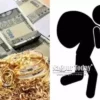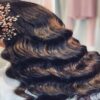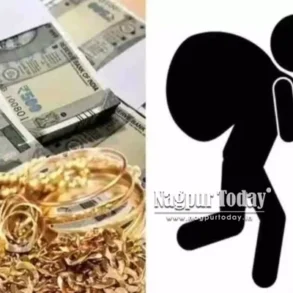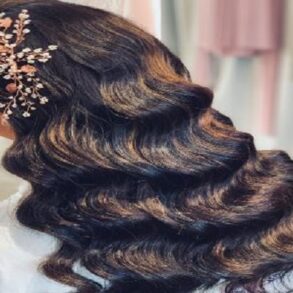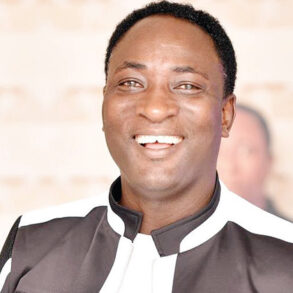Just four years after winning an Academy Award for his illustrated book turned short film, Hair Love, creator Matthew A. Cherry has styled up a 12-episode expansion that further beautifies the world of the animated six-minute short. Set two months after the events of Hair Love, Young Love shines light and love on the joys, struggles, and occasional existential crises that can arise while trying to balance parenthood and a steady career.
Through the viewpoint of the Young-Love family members, Angela Young (Issa Rae), a natural hair blogger and stylist, who is trying to get her groove back after her cancer falls into remission, her partner Stephen Love (Scott “Kid Cudi” Mescudi), a passionate music producer and their bright daughter Zuri Young-Love (Brooke Monroe Conaway) audiences can get a relatable feel as they navigate the ups and downs of their personal and professional lives in West Side, Chicago.
Below, Cherry talks to Deadline about why he decided to make Young Love an all inclusive series about social inequalities, parenthood and struggling millennials.
DEADLINE: The tone of the Young Love series is different from the previous short, Hair Love. Somehow, you’ve all managed to tow the juxtaposing line between something that is family-friendly and hard adult comedy. It’s risque at times but not vulgar. But considering that the show focuses more on the parents than Zuri, who do you consider the audience for the show?
MATTHEW A. CHERRY: We just made it for families. I have a young daughter now; she’s not old enough to be watching TV regularly like that, but we just know that kids like watching things that aren’t talking down to them. And we wanted to do something where grandparents and parents could watch it with their grandkids and kids. So, we tried to make a family-friendly show. Trying to find the tone of this was the hardest part. I’ve never really seen a millennial-focused animated show done in this way. Typically, you think of animation; all the parents are in their 40s and 50s, already well-established in their careers.
And then we also have this big audience aware of the characters from the book and the short film. So, we wanted to represent and didn’t want to turn people off who already love Zuri from the book and short film. But we also wanted not to shy away from real topics because while the short film is also family-friendly, we deal with real life. We deal with things like cancer and trying to come back from that illness, you know? So that was the guiding light on trying to find the tone. We wanted this to be something kids can enjoy but not shy away from adult topics millennials deal with.
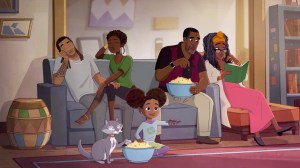
DEADLINE: Hair Love was born from the need to see more girl-dad representation in the media. So now, just a couple of years after the Oscar win, what would you say is the impetus for expanding that world for Young Love?
CHERRY: It was a few things. Obviously, the dad representation was a big one, but it was also the irony that when dads step up on social media, and you see a video of a dad doing the hair, it’s always like, “Oh my God, let’s fawn over the dad.” And it’s like, this is just regular everyday stuff. I think the way parenting is now in a lot of families, it’s less about gender roles, and it’s like, “Yo, rent is high, we both got to work. We got just to figure this shit out.” You can’t be just saying, “I’m only going to do one thing, and you do this.” Whoever’s available will have to get in there and figure it out. Then it was also about representation in animation, representing fathers, and also having a character like Zuri who loves her natural hair. So, with the series, the big word we use is relatability. There are a lot of shows out now that show the 1%. It’s all about having the big money, the big house, the big cars and things. I think we’ve gotten a little bit away from the shows that are relatable. The vast majority of America is struggling, not making what they deserve to make. Obviously, that’s apparent from even the writers’ and the actors’ strikes, and we just wanted to make something relatable. And there’s, to me, a lot more comedy in just the struggle. You work hard, you finally get that check, you’ve been waiting on that net 60, and you get the check, and you had already spent it in your mind, and now your car breaks down. It just feels real, and that to us really was just trying to continue expanding on these characters, but then also just hopefully providing some entertainment for the everyday person just trying to make it. This one’s for you.
DEADLINE: Seeing that this is a Black show, there are some highly specific cultural references, especially regarding Stephen having to exist in white corporate spaces on occasion in the music industry. Can you talk to me about the balance between making something specifically cultural and universal?
CHERRY: The thing that was really dope is that the short was a bit of a training ground for that. Hair Love is very specific, starring a Black dad with locks like me. And this young girl that has this really big natural 4C hair. And it’s wild, during that process, I got tagged every day, probably in different pictures of dads reading the book to their kids. And it’s not just Black dads doing it; it’s white dads, Asian dads, Hispanic dads. It’s been really cool just seeing the universality of it. And I think in film and TV, the more specific you get, the more universal things become. And I think animation is also really great in just helping things be universal because it’s a medium where we fall in love with animals and robots and all kinds of inanimate objects and animals and things that just talk and do things that they don’t do in real life, and it makes you feel something. And so, my thing is if we could feel empathy for a tiger or a lion [like in a Disney movie], it’s much easier to feel that same empathy for a Black family trying to make it on the West Side of Chicago.
We just try to be specific, unapologetically Black in a lot of instances. And it’s like we all can relate to being in our 20s and struggling to figure it out. We may not all have a kid, but we all are working to make a better life for somebody, be that ourselves or our family. And that’s very universal.
DEADLINE: What were some fun challenges? I’m thinking specifically about anything from working with Kid Cudi and your music team on creating beats and song lyrics and all the fun, creative Black hairstyles shown throughout the series.
CHERRY: Creating the music for the show and for Stephen’s character was amazing. Having him be a music producer really allowed us to create some dope music. And the thing with Stephen is that he has a very forward-thinking sound–think of a group like The Neptunes. He is not interested in the popular radio stuff that’s on the radio today. He’s trying to make a sound that will be the timeless next thing that people get into. But he works in an industry where he’s in Chicago, and he’s got to try to figure out how to put money on the table, and these artists aren’t interested in that. And so, it’s finding that balance.
We work with Amanda Jones, a Black woman who’s an incredible composer, and Taylor Graves, an incredible and award-winning producer in his own right; he did all the music and beats for Stephen’s character. We just had so much fun with it. Those were also the moments where it was incorporated in finding the tone of the series. Like, when we’re in the adult world [of music], let’s be in the adult world, let’s not sugarcoat what it’s like trying to be a producer today working in hip hop, or for Angela’s character, let’s not sugarcoat what women talk about in the hair salon. We wanted actually to be immersed in these worlds. So beat-making was really fun, and we hope to put out a soundtrack with a couple of the songs on there, too. We have Brittney Carter in the first episode; she’s a dope independent artist from Chicago, so we just tried to be as authentic as possible with the show.
As for the hair, it’s hard because you only get so many assets in animation, and we were like, “She can’t wear afro puffs everywhere.” If she’s going to bed, we got to put a bonnet on her, if she’s going somewhere a bit more fancy the style is also going to be more dynamic. We just wanted it to be representative of real life, and little girls always rock a multitude of hairstyles. We also wanted to represent the brevity of Black people; some of us are bald, some have locs, and some have braids or low cuts. One of the other things to add to that was skin tone; if you even look at the family, the undertones of colors, Loretta Devine (who plays Angela’s mother, Gigi Young) having a little bit more red in her undertones, versus Stephen, whose a little bit more brown and obviously, Issa’s character, Angela, being dark skin, darker compared to Stephen. It was just trying to be very thoughtful about the images you’re putting out from not just hair but also skin tones. And being aware about how a certain type of family is depicted or a certain type of love interest is always being depicted, and trying to just do our part in combating that and showcasing that there’s all different types of relationships that you can get into and different type of love combinations. It was such a cool process.
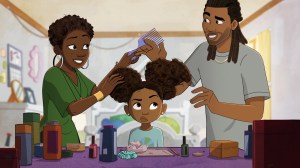
DEADLINE: Back to tackling heavy, real-life topics. Along with tackling the aftermath of Angela’s cancer diagnosis, in the show, you’ve also got an episode regarding homelessness, social media exploitation, and what it means to steer from trouble on the streets of Chicago. These are some delicate topics to tackle; what was the reason for you to keep these in? Why was it important to you?
CHERRY: The cool thing about focusing on the millennial family is–especially because I’m on the older side of the millennial stuff– there’s so much stuff that’s newer to us that didn’t exist for our parents. This idea of doing charity on social media, or us not really being as trustworthy of religion in the same way that our parents were. And just all these topics that are just a little different, in that our parents didn’t really have to deal with them in the same way that we do you. Even having a relationship and being on social media, et cetera. It was like if it felt real to us, it must be real for the characters.
With Angela, in the short, she was a natural hair blogger, and now she’s coming off this illness and really trying to find her way back. She’s trying to find her life purpose and her particular thing. And hopefully, you notice that every episode is her trying a different thing outside of being a hairstylist; she’s trying to find her place in everything. In the episode with the homeless family, it’s also relatable. Zuri is such a great kid; she wants to help [the homeless student in her class], but then Angela sees this opportunity [to make content about them on social media to exploit their situation for views]. And that’s really about just trying to showcase this new world that we live in. Rent is crazy expensive, and for some people, it’s easier to live in your car than it is to try and grind hard every day to be able to pay that rent. So, to do that through the eyes of both Zuri and Angela was really cool. But then also in that same storyline, you have Amir, Stephen’s nephew, and how his mom is not there [for him], so Stephen tries to be present in his life, too. We found a good mix of touching real topics while keeping the heart in there.
DEADLINE: The show also has a lot to say about the struggles of being a creative, artsy person in general trying to elevate yourself and make your stamp on the world. As someone like yourself who started off in a sports career before jumping into the film and TV industry and becoming an Oscar winner, how much of your own experience did you place in these characters?
CHERRY: We had an incredible crew. The way I like to try to be creative when working on something that involves multiple people is you can’t be scared to [express ideas]. Good ideas exist everywhere, right? I started as a production assistant; there would be times when I wish I could have chimed in on something to help it make it better. But not everybody likes to move like that. So, I think you have to allow people to bring themselves to the project. We had a great writer’s room. We also had great producers who were able to call out things that we might’ve been missing or looking at things and be like, “Oh man, maybe if we flipped it like this, it might hit a little better.” So it’s definitely a combination of personal experiences, but also all of our writers’ experiences and producers. We were never afraid to get a good idea from somewhere else. And if it isn’t a direct recollection of our experience, it definitely is of somebody in our crew.
Young Love is streaming now on Max , debuting with four episodes starting September 21. The twelve-episode season will then continue with four episodes weekly, leading up to the season finale on October 5.
[This interview has been edited for length and clarity]
This post was originally published on this site be sure to check out more of their content.

